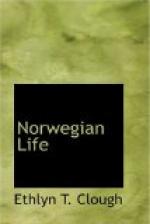One of the most original writers whom Norway produced and kept at home during the period of the union with Denmark was the preacher and poet, Peder Dass (1647-1708). The best known among his secular songs is Nordlands Trompet, a beautiful and patriotic description of the northern part of Norway.
Ludvig Holberg was born in Bergen, Norway, Dec. 3, 1684. His father, Colonel Holberg, had risen from the ranks and distinguished himself, in 1660, at Halden. Shortly after his death the property of the family was destroyed by fire, and at the age of ten years Ludvig lost his mother. It was now decided to have him educated for the military service; but he showed a great dislike for military life, and, at his earnest request, he was sent to the Bergen Latin School. In 1702 he entered the University of Copenhagen. Being destitute of means, he took a position as private tutor. As soon as he had saved a small sum he went abroad. He was first in Holland, and afterward studied for a couple of years at Oxford, where he supported himself by giving instruction in languages and music. Upon his return to Copenhagen he again took a position as private tutor and had an opportunity to travel as teacher for a young nobleman. In 1714 he received a stipend from the king, which enabled him to go abroad for several years, which he spent principally in France and Italy. In 1718 he became regular professor at the Copenhagen University. Among Holberg’s many works the following are the most prominent: Peder Paars, a great comical heroic poem, containing sharp attacks on many of the follies of his time; about thirty comedies in Moliere’s style, and a large number of historical works. Holberg, who was ennobled in 1747, died in January, 1754, and was buried in Soroe Church. His influence on the literature and on the whole intellectual life of Denmark was very great. He is often called the creator of Danish literature.
Christian Baumann Tullin (1728-1765), a genuine poetical genius, who has been called the father of Danish lyrical verse, was born in Christiania, and his poetry, which was mainly written in his native city, breathes a national spirit. From his day, for about thirty years, Denmark obtained the majority of her poets from Norway. The manager of the Danish National Theater, in 1771, was a Norwegian, Niels Krog-Bredal (1733-1778), who was the first to write lyrical dramas in Danish. A Norwegian, Johan Nordal Brun (1745-1816), a gifted poet, wrote tragedy in the conventional French taste of the day. It was a Norwegian, Johan Herman Wessel (1742-1785), who by his great parody, Kjaerlighed uden Stroemper, “Love without Stockings,” laughed the French taste out of fashion. Among the writers of this period are also Claus Frimann (1746-1829), Peter Harboe Frimann (1752-1839), Claus Fasting (1746-1791), John Wibe (1748-1782), Edward Storm (1749-1794), C.H. Pram (1756-1821), Jonas Rein (1760-1821), and Jens Zetlitz (1761-1821), all




